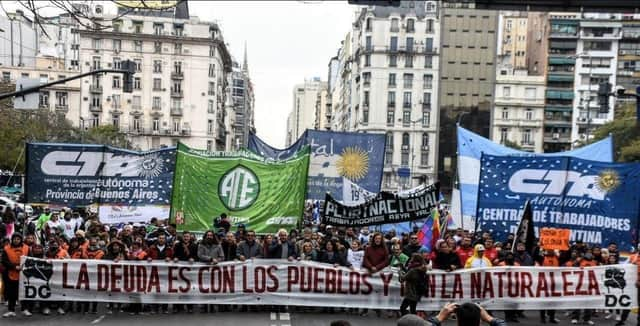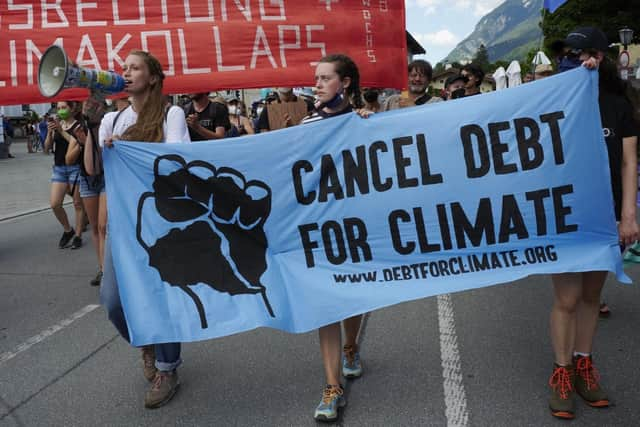Enviroment: Too many of us know how debt can take control of what we can and cannot do


One reason was the huge rise in interest rates resulting from ‘the markets’ being spooked by the proposed ‘unfunded debt’ – massive increases in government spending with no idea how it would be paid for.
Another reason was the UK’s continuing energy dependence on natural gas – a key climate-damaging fossil-fuel – and the mini-budget’s failure to prioritise protecting people from the full impact of the recent huge rises in global gas prices.
Advertisement
Hide AdAdvertisement
Hide AdSo despite a decade of austerity and stagnant wages, the UK now owes more than its entire annual income – in 2021 UK national debt rose to 105% of GDP, up from 38% in 2008.


Another consequence of austerity has been to increase household debt – borrowed money to meet day-to-day needs. Personal debt stands at £1.7 trillion, £34,235 per adult – incurring £857 in interest annually, a heavy financial burden for 10% of adults.
It’s getting worse. Last year debt rose by £1176 per adult, which with the rise of inflation, increased food and fuel costs, and higher interest rates, will drive even more people into poverty.
The global picture is just as bad. Debt totals $330 trillion, which is 3.5 times global GDP and doubling every 8 years. 54 nations are in a debt crisis that threatens the stability of all countries, including 8 countries at risk of default.
Advertisement
Hide AdAdvertisement
Hide AdToo many of us know how debt can take control of what we can and cannot do. It may be surprising to learn that it is also affecting one of the other huge crises that the world faces – the climate crisis.
Just last week the UN reported that the world is close to ‘irreversible climate breakdown’ with ‘no credible path to 1.5 degrees in place’. This is catastrophic for people living in the Global South now and will seriously affect people here.
Debt is an important reason why the necessary steps to prevent damage to people and planet has been so woefully ignored.
Debt underlies and perpetuates inequality. When in debt, money we earn is used to pay interest to those who have enough to lend it, meaning that money moves from the poorer to the richer – from poorer to richer people and from poorer to richer countries. If we feel worse off, someone else will be feeling better off: that is how money works.
Advertisement
Hide AdAdvertisement
Hide AdThe poorer you are, the less able you are to adopt lifestyle changes that can help to solve the climate crisis. Speaking personally, as my business struggles with electricity and material costs, I cannot afford an electric van, and even the Clean Air Zone charge feels threatening.
For Nigeria, fossil fuel revenue is needed to pay the interest on the loans the government has to take out. Therefore Nigeria cannot stop oil extraction, even though its waters are polluted and flooding has just killed hundreds. Debt and poverty prevent the climate crisis being addressed, it drives countries to exploit their environments, and it profits those most responsible for it.
There is a solution that has come from the Global South: it’s called Debt for Climate and is beautifully simple.
Foreign debts are cancelled, and the financial space created will enable indebted countries to keep fossil fuels in the ground, allowing global warming targets to be met. Debt cancellation can partly be offset by Loss and Damage funds that the rich countries have pledged.
Advertisement
Hide AdAdvertisement
Hide AdAt last there is a realistic way to end the tragedy of Global South debt driving global warming, while bringing working people behind the initiative, as it allows for a ‘Just Transition’ of society, and achieves the redistribution of some of the wealth that the super-rich have gained throughout austerity and the pandemic.
Debt cancellation is possible: it has been done throughout history. The word Jubilee means celebration, but it specifically means celebration of cancelled debt, which allowed societies, collapsing under the weight of injustice, to be reset and flourish again. The slaves were released from debt bondage and the lands were redistributed.
In 2000, $100 billion of debt was cancelled. In 2008 $5 trillion ‘saved’ the bankers and cleared their debts. Every limited company that fails has its debts cancelled.
On Wednesday 9th November, Esteban Servat, founding member of Debt for Climate Campaign, will be delivering this clear message in Sheffield. Global Justice Sheffield has arranged for him to speak at a public meeting to which all are welcome.
Advertisement
Hide AdAdvertisement
Hide AdHis talk will be of particular interest to Trade Unionists, climate campaigners and social justice groups, but also to anyone who would like to find out more about this new approach.
Esteban will explain how this strategy could be brought about, and how a renewed call for debt cancellation could help reset society, allowing the needs of nature to be addressed and enabling solutions for the cost of living crisis.
In ancient times a trumpet call announced the debt cancellation. In this Jubilee year a debt Jubilee would be something to really celebrate.
Solving The Debt And Climate Crisis Together 9th November 7.15pm Central United Reformed Church, S1 2JB. [email protected]